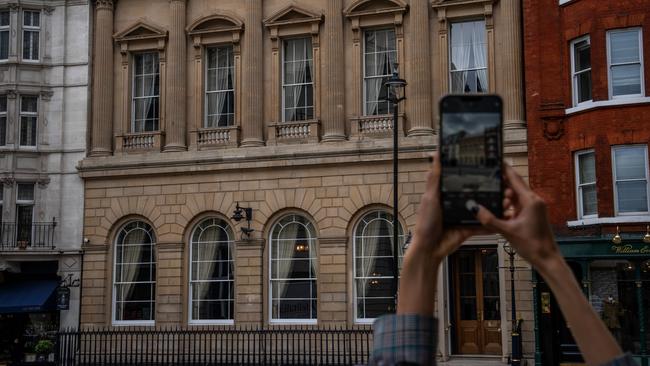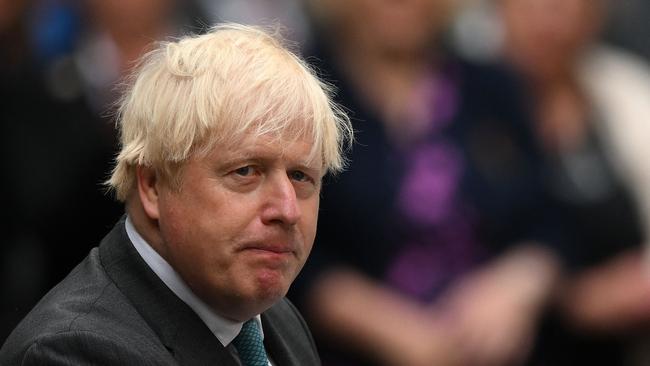Logic of Brexit is turning Britain back to Europe
No great new trade deal has been achieved and the American hope has faded, so expect a tiptoeing back towards the EU.
![The CIty of London, the financial centre, retains its sense of importance. Above, trumpeters perform during its Lord Mayor's Banquet at The Guildhall on November 28. Britain is ‘a trading nation living cheek-by-jowl with an immense trading bloc that remains by far [its] biggest trading partner’. Picture: Getty Images](https://content.api.news/v3/images/bin/86b2a5f89a4d045dd6789f2999d14229?width=650)
What could I say to them? In my diary since April has been a dinner last Wednesday, at which I would speak. My hosts were the Conservative members of the European Parliament Alumni Association – a long title for what one of them self-deprecatingly told me was “a crowd of superannuated Tory former MEPs crying into our beer about what has happened”. And it is true that Brexit has shocked and depressed us all. But the Carlton Club was hospitable; there were old friends to see and good stories to exchange; and the occasion was fun.
But what about my speech? Were we to spend the evening crying over spilt milk? I enjoy attack and defence, but nostalgia doesn’t get me going. From the moment I’d promised a speech, I’d worried about its content.

Yet as the day approached, my worries fell away. There was, after all, good news to share. Britain’s place in Europe is looking more and more like unfinished business. Ours (I said) was not a lost cause. For years we former Remainers had felt like Jacobites toasting a dispensation we should never see again; post-1917 Russian emigres gathering to lament the fate of Tsar Nicholas. But we were now, once more, and despite our advanced age, the future.
Brexit is over: all over bar the shouting that’s likely to continue another year or two until the likes of Nigel Farage, Bill Cash and Jacob Rees-Mogg finally shuffle from the political stage. There will be no big bang. Pack away the balloons and streamers, I advised. Britain is unlikely formally to rejoin the European Union within the lifetimes of most of us there at the Carlton Club. But the alternative – the alternative for which, with blood and tears, Theresa May and Boris Johnson wasted years that Britain will never get back and from which the Conservative Party may never really recover – has run out of road: a broken dream. The thing Johnson boasted he had “got done” turns out to be anything but final. Europe is back on our political and economic horizon.

Most people know this, however subliminally. The terminal sickness of Brexit has become one of those unmentionables that careful politicians must avoid confronting. Why stick heads above parapets? But they suspect – and, more important, their children know – that this is the direction of travel.
Water flows downhill, though we may not know what path it will take or how long before it gets there. A trading nation living cheek-by-jowl with an immense trading bloc that remains by far our biggest trading partner (four times the size of the second biggest, the United States) will feel economic pressure from only one direction: to converge, reducing the barriers our imports and exporters face. That was the whole purpose of Margaret Thatcher’s great achievement: the single European market.
After 2016 the logic always pointed to what we called the “Norway model”. But the argument for this softest version of Brexit suffered from one devastating logical objection, encapsulated in the phrase “rule-takers but not rule-makers”. How could it be better to leave that Brussels table yet abide by the rules made around it? We Remainers had no answer because the referendum had directed the government to leave the table. The Leavers, meanwhile, did have a perfectly logical answer: if necessary, take the hit to UK-EU trade, but more than make up for it by vastly increasing our trade with the rest of the world, with which we’d surely make great new trade deals. Remainers could protest (and we did) that these deals were not within the United Kingdom’s reach, but we couldn’t prove it.
The passage of time is now doing so. Six years after that referendum no great new trade deal has been achieved, none looks within reach, and the American hope has faded to nothing. That really leaves only communist China as a target for significantly increasing trade. Sir Iain Duncan Smith, a vocal China hawk, might care to reflect on this.
Such is the logic underlying the likely drift of Britain’s future and emerging trade, regulatory and environmental policy. But how will it happen? Rishi Sunak, who will be Prime Minister until the next general election, does not strike me as a doctrinaire kind of Leaver but he has a Brexity rump in his parliamentary party. He will be careful. No more gossip about a “Swiss-style” solution; no talk about wanting to snuggle closer to the EU, but instead a series of individual decisions that point that way. Which “retained” EU law to keep, after representations from business and industry? Whether (I suspect not) to proceed with the troubled British Bill of Rights Bill, which indirectly sours UK-EU relations? Whether to compromise (we probably will) to fix the Northern Ireland protocol?
We’ll continue trying to join Horizon, the EU’s key funding program for scientific research and innovation. Then there’s Euratom and Copernicus, where we could knock at the door without frightening the Brexit horses. In each case there will be resistance from Brussels to British cherry-picking, but this in itself will increase the pressure not to antagonise the EU in other areas. We’ll think hard about President Macron’s proposed European nations’ “club”, another snuggle-up platform. And the Ukraine war will play to European ideals of solidarity: you’ll see Sunak avoid any opportunities to sneer at allies.
Between now and the next general election, Sir Keir Starmer will probably duck the European question, not because he doesn’t want convergence but because he does. There are no good Labour reasons to resist some kind of associate membership of the European single market, but Starmer (who has the centre-left graduate vote already in his pocket) will not want to risk alienating former red-wall working-class Labour voters. If he becomes our next prime minister, expect a cautious and largely unacknowledged tiptoeing towards closer association. For the next few years, it will happen by stealth.
I used the expression “unfinished business”. It would be foolish to predict how far or fast Britain will be drawing back from our careless decision in 2016, but the reasoning is hard to dispute, and pressure will intensify. I confess personally – and did to all those retired MEPs on Wednesday – that I’ve never warmed to Brussels and nor am I yet confident the EU can keep the show on the road. But storming out always struck me as idiotic. Inching back now looks like the future. Probably the oldest audience I’ve ever addressed is being joined by a swelling opinion that will come, and is coming, from their grandchildren.
The Times



To join the conversation, please log in. Don't have an account? Register
Join the conversation, you are commenting as Logout